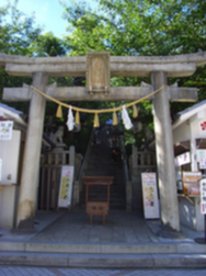受全球经济危机影响,不少日本人都成了失业一族。前途渺茫,人们自然心中不快。为了帮助这些人扫除心中的怨气,对生活重拾信心,日本一家寺院特意设立了一个“苦难之神”供人们泄愤。在这里,人们不用鞠躬敬拜,取而代之的是“三打、三踢、扔豆子”仪式。参拜“苦难之神”的人们必须要用一个拍子打它三下,然后踢它三下,之后还要往神像身上扔豆子,以此方式来驱除厄运和消极情绪。

 |
|
A Japanese shrine offers down-on-their-luck visitors a chance to shake off the doldrums by hitting the "God of Poverty."
|
Lost your job and looking for someone to punch up for causing the global financial crisis? A Japanese shrine offers down-on-their-luck visitors a chance to shake off the doldrums by hitting the "God of Poverty."
The Bimbo Gami shrine is home to a wooden statue believed to be the poverty deity, a thin and filthy man who brings misfortune and impoverishment to the house it haunts.
Visitors who travel to the shrine in mountains about four hour's drive from Tokyo can beat, kick and throw dried beans at the god to vent their anger.
"What you do here is hit it hard and defeat poverty in your heart, then stay positive by having a deep conviction that there will be good things," said 77-yer-old shrine master Tessen Sakura, a former banker who founded the shrine 11 years ago.
At most shrines, worshippers pay their respect to the god. But at Bimbo Gami, visitors must hit the statue three times with a bat, kick it another three times, and then throw beans at a target to drive away negative spirits and bad luck.
With Japan's economy in recession on the back of the global crisis, and many people finding themselves unemployed, thousands have visited the shrine in recent months.
Some days, as many as 500 people come to batter the god, with several visitors saying this has helped diminish their anger at the dire economic situation.
"I feel like I've been able to get rid of the rancor of the past 50, 60 years," said 77-year-old Toshitami Ota, who came from a neighboring province with a busload of visitors.
"Japan's overall economy is bad, but the stress you feel is a personal one. Of course, you think about the whole picture, but there are also a lot of things to worry about yourself," added Yoko Takeda, 52-year-old elderly care worker.
Although the shrine master and his wife Haruko, 68, had been involved in several failed several business projects before founding the shrine, the god of poverty seems to have proven lucky for the elderly couple.
They now live off a fairly stable income generated from selling good luck charms to visitors.
(Agencies)

(英语点津 Helen 编辑)
charm: 符咒